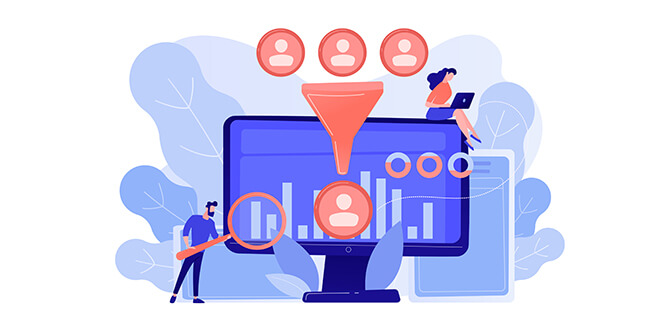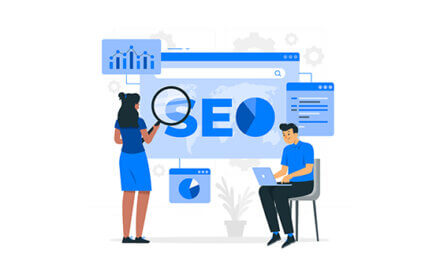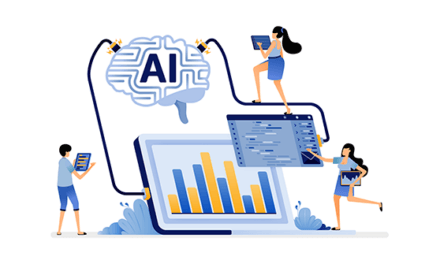Key Takeaways
- Lead scoring is crucial for prioritizing leads, enhancing efficiency, and aligning marketing and sales strategies.
- Tools like Salesmate, Zoho CRM, HubSpot Marketing Hub, and others offer unique features, pros, and cons, catering to diverse business needs.
- Integration of AI and ML, enhanced data analysis with big data, and integration with CRM and marketing automation tools are key trends shaping the future of lead scoring software.
- Advancements in lead scoring technologies are pivotal in driving the efficiency and effectiveness of sales and marketing efforts in the digital era.
As we navigate the bustling world of digital marketing in 2024, the art of identifying and nurturing potential leads has never been more crucial.
Lead scoring software has emerged as a game-changer in this dynamic landscape, offering businesses the power to solve every lead’s potential precisely.
Imagine a tool that ranks prospects based on their likelihood to convert and arms your marketing and sales teams with actionable insights, transforming how you engage with your audience.
It is no longer a fragment of imagination but a reality made possible by today’s best lead scoring tools. The quest for the most effective lead scoring solutions has become a top priority, from small startups to large enterprises.
In this article, we delve into the top 10 lead scoring tools of 2024, offering detailed insights into their features, advantages, limitations, and overall suitability for various business sizes and types.
We evaluated each software that helps you select the lead scoring platform that best suits your business needs and elevates your lead management strategies.
So, let’s dive in!
Overview of the best lead scoring software you must consider
This table provides a quick overview of each software’s pricing, key features, and G2 ratings, helping you compare and choose the best option for your needs.
| Sr. No. | Software | Pricing | Features | G2 Ratings |
| 1. | Salesmate | Basic: $23, Pro: $39, Business: $63, Enterprise: Contact sales | Advanced lead scoring, Pipeline management, Power dialer, Sales & marketing automation, Built-in calling, Sequences, Live chat, Shared team inbox, Meeting scheduler, Reporting & analytics | 4.5/5 |
| 2. | Zoho CRM | Standard: $12, Professional: $20, Enterprise: $35 | Customizable lead scoring rules, Extensive CRM capabilities, AI-powered insights, Strong integration features | 4.4/5 |
| 3. | HubSpot Marketing Hub | Professional: $800/mo, Enterprise: $3600/mo | Lead scoring based on user interactions, Seamless integration with HubSpot CRM, Powerful marketing automation | 4.4/5 |
| 4. | Freshsales | Blossom: $12, Garden: $25, Estate: $49, Forest: $79 | Contact scoring, Sales Sequences, Sales Forecasting, Automated workflows | 4.5/5 |
| 5. | Salesforce Sales Cloud | Starter: $24, Professional: $80, Enterprise: $165 | Customizable lead scoring, Extensive integration options, Powerful analytics | 4.3/5 |
| 6. | EngageBay | Free: $0, Basic: $12.74, Growth: $55.24, Pro: $101.99 | Lead segmentation, Automated workflows, Predictive lead scoring, Social suite | 4.6/5 |
| 7. | Monday Sales CRM | Basic: $12, Standard: $17, Pro: $28, Enterprise: Contact sales | Performance tracking, Sales forecasting, Lead capturing, Contact management | 4.6/5 |
| 8. | Keap | Pro: $159, Max: $229, Ultimate: $279 | Advanced lead scoring, Email marketing automation, Sales pipeline management, Reporting & Analytics | 4.2/5 |
| 9. | ActiveCampaign | Lite: $29, Plus: $49, Professional: $149, Enterprise: $259 | Marketing automation, Site tracking, Segmentation, Email marketing | 4.5/5 |
| 10. | MadKudu | Growth: $1999, Pro: $3499, Enterprise: Custom pricing | Predictive lead scoring using AI, Integration with major marketing platforms, Real-time lead evaluation | 4.4/5 |
10 Effective lead scoring software for modern marketers
Lead scoring is a pivotal strategy in modern marketing and sales operations. It involves ranking prospects against a scale to determine their sales readiness.
The right lead scoring software can streamline this process, enabling businesses to prioritize leads effectively. The following are the best lead scoring software that stands out for its efficiency, accuracy, and advanced features.
1. Salesmate
Salesmate is a versatile CRM and lead scoring platform designed for businesses looking to streamline their sales process. It offers intuitive interfaces and automated workflows to enhance lead management and customer relationships.
Key features
- Advanced lead scoring
- Pipeline management
- Power dialer
- Sales and marketing automation
- Built-in calling
- Sequences
- Live chat
- Shared team inbox
- Meeting schedulers
- Reporting & analytics
Pricing
- Basic: $23 per user per month
- Pro: $39 per user per month
- Business: $63 per user per month
- Enterprise: Connect with our sales team for enterprise pricing
Pros
- User-friendly interface
- Customizable workflows
- Robust integration with various tools
- Offers 700+ integrations
Cons
- Advanced features may be overwhelming for some users
- Limited customization options in the user interface
- Occasional glitches in updates
G2 Ratings
- G2 rates Salesmate 4.5 out of 5 stars based on user reviews.
2. Zoho CRM
Zoho CRM is a popular CRM solution that includes sophisticated lead scoring features. It’s known for its adaptability to various business sizes and industries.
Key features
- Customizable lead scoring rules
- Extensive CRM capabilities
- AI-powered insights
- Strong integration features
Pricing
- Standard plan: $12 per user per month
- Professional plan: $20 per user per month
- Enterprise plan: $35 per user per month includes advanced customization and reporting features
Pros
- Versatile and customizable
- Strong third-party integrations
- Excellent customer support
Cons
- Can be overwhelming for beginners due to its extensive features.
- The mobile app needs improvement.
G2 Ratings
- G2 rates Zoho CRM 4.4 out of 5 stars based on user reviews.
3. HubSpot Marketing Hub
HubSpot Marketing Hub is a comprehensive inbound marketing software offering a range of tools including lead scoring. It’s ideal for businesses focused on inbound marketing strategies.
Key features
- Lead scoring based on user interactions
- Seamless integration with HubSpot CRM
- Powerful marketing automation
Pricing
- Professional: $800/mo
- Enterprise: $3600/mo
Pros
- User-friendly interface
- Excellent customer support
- Wide array of features
Cons
- Can be expensive for small businesses, especially when scaling up.
- Some advanced features require a steep learning curve.
G2 Ratings
- G2 rates HubSpot 4.4 out of 5 stars based on user reviews.
4. Freshsales
Freshsales, part of the Freshworks suite, is a dynamic CRM system with built-in lead scoring functionality. It’s designed for high-velocity sales teams needing efficient lead management.
Key features
- Contact scoring
- Sales Sequences
- Sales Forecasting
- Workflows
Pricing
- Blossom: $12 user/month
- Garden: $25 user/month
- Estate: $49 user/month
- Forest: $79 user/month
Pros
- Intuitive UI
- AI-powered insights
- Excellent automation features
Cons
- Limited customization in certain areas
- Reporting features could be more extensive
G2 Ratings
- G2 rates HubSpot 4.5 out of 5 stars based on user reviews.
5. Salesforce Sales Cloud
Salesforce is a leader in the CRM space, offering robust lead scoring capabilities. It caters to businesses of all sizes seeking a comprehensive CRM solution.
Key features
- Customizable lead scoring
- Extensive integration options
- Powerful analytics
Pricing
- Starter: $24 per user per month
- Professional: $80 per user per month
- Enterprise: $165 per user per month
Pros
- Highly customizable
- Strong reporting tools
- Vast ecosystem of apps
Cons
- Complexity can be overwhelming for new users
- Expensive for small businesses
G2 Ratings
- G2 rates HubSpot 4.3 out of 5 stars based on user reviews.
6. EngageBay
EngageBay is an all-in-one sales and marketing platform that includes effective lead scoring to help businesses nurture and convert leads.
Key features
- Lead segmentation
- Automated workflows
- Predictive lead scoring
- Social suite
Pricing
- Free: $0 per user per month
- Basic: $12.74 per user per month
- Growth: $55.24 per user per month
- Pro: 101.99 per user per month
Pros
- Affordable for small businesses
- Intuitive design
- Good customer support
Cons
- Limited functionality compared to larger platforms
- Occasional issues with software updates
G2 Ratings
- G2 rates HubSpot 4.6 out of 5 stars based on user reviews.
7. Monday sales CRM
Key features
- Performance tracking
- Sales forecasting
- Lead capturing
- Contact management
Pricing
- Basic: $12 seat /month
- Standard: $17 seat /month
- Pro: $28 seat /month
- Enterprise: Contact sales
Pros
- Highly customizable and visually intuitive
- Excellent for managing multiple projects and sales pipelines
Cons
- Limited marketing tools
- Some features might be too simplistic for advanced CRM users
G2 Ratings
- G2 rates HubSpot 4.6 out of 5 stars based on user reviews.
8. Keap
Keap (formerly Infusionsoft) is a comprehensive CRM and marketing automation platform that offers lead scoring to help businesses grow and manage customer relationships effectively.
Key features
- Advanced lead scoring
- Email marketing automation
- Sales pipeline management
- Reporting & Analytics
Pricing
- Pro: $159 per month with 1500 contacts
- Max: $229 per month with 2500 contacts
- Ultimate: $279 per month with 2500 contacts
Pros
- Strong automation capabilities
- Good for small to medium-sized businesses
- Integrates well with other tools
Cons
- The platform can be complex for beginners
- Customization feature isn’t very flexible
G2 Ratings
- G2 rates HubSpot 4.2 out of 5 stars based on user reviews.
9. ActiveCampaign
ActiveCampaign is a widely used marketing software that offers sophisticated automation, analytics, and reporting capabilities to suit the needs of companies of all kinds.
Key features
- Marketing automation
- Site tracking
- Segmentation
- Email marketing
Pricing
- Lit: $29 per month (1 user)
- Plus: $49 per month (3 users)
- Professional: $149 per month (5 users)
- Enterprise: $259 per month (10 users)
Pros
- Highly effective for email marketing
- Intuitive interfaces
- Strong automation features
Cons
- CRM component is less developed compared to other platforms
- Can be overwhelming due to its extensive features
G2 Ratings
- G2 rates HubSpot 4.5 out of 5 stars based on user reviews.
10. MadKudu
MadKudu is a predictive lead scoring software that specializes in analyzing big data to identify the most promising leads for businesses, particularly useful for large-scale operations.
Key features
- Predictive lead scoring using AI
- Integration with major marketing platforms
- Real-time lead evaluation
Pricing
- Growth: $1999 per month
- Pro: $3499 per month
- Enterprise: Custom pricing
Pros
- Excellent for data-heavy environments
- Provides deep analytical insights
Cons
- Can be complex and require a good understanding of data analytics
- May be overkill for small businesses
G2 Ratings
- G2 rates HubSpot 4.4 out of 5 stars based on user reviews.
Criteria for selecting the right lead scoring software
Choosing the right lead scoring tool is critical for any business looking to enhance its sales and marketing efficiency in 2024.
With many options available in the market, it’s essential to consider several factors to ensure that the selected software aligns well with your business objectives and operational needs.
Here are the detailed criteria to guide you in selecting the most suitable lead scoring platform:
1. Integration capabilities
- Seamless CRM integration: The software should easily integrate with your existing customer relationship management (CRM) Systems and marketing automation tools. This integration ensures a smooth data flow across platforms, enabling a comprehensive view of each lead.
- Compatibility with other tools: Besides CRM, the software should be compatible with other tools like email marketing platforms, social media, and analytics tools to provide a holistic approach to lead management.
2. Customization options
- Flexibility in scoring criteria: The software should customize scoring criteria to suit your specific business model and industry nuances. It includes setting different scores for demographic information, online behavior, engagement levels, and more.
- Adaptability: The platform should adapt to changing market trends and allow you to modify scoring models as your business evolves.
3. User-friendly interface
- Ease of use: A user-friendly interface is crucial. The platform should be intuitive and easy to navigate, even for users who are not technically inclined.
- Training and resources: The availability of training materials, tutorials, or webinars can be instrumental in helping your team maximize the use of the software.
4. Scalability
- Accommodate business growth: The software should be scalable to handle an increasing volume of leads and complexity as your business grows.
- Performance stability: Look for lead scoring systems that maintain their performance and efficiency as the scale of operations increases.
5. Analytical capabilities
- Robust reporting: The software should offer comprehensive reporting and analytics features to track the performance of your lead scoring strategies.
- Insightful analytics: Look for lead scoring tools that provide actionable insights, not just data, helping you to refine your approach continuously.
6. Compliance and security
- Data protection: The platform must comply with data protection regulations like GDPR, ensuring your lead data is handled securely.
- Security features: Check for security features like encryption, secure data storage, and regular security updates.
7. Cost-effectiveness
- Transparent pricing: Understand the pricing structure of the software. It should be transparent, with no hidden costs.
- ROI evaluation: Evaluate the potential return on investment. The best software offers a balance between comprehensive features and affordability.
8. Customer support and training
- Reliable support: Customer support is crucial for resolving issues quickly and efficiently.
- Training and resources: Adequate training and educational resources are essential for getting the most out of the software.
Benefits of using lead scoring software
Utilizing lead scoring software offers numerous advantages for businesses looking to optimize their sales and marketing efforts. Here’s a detailed look at these benefits:
- Improved lead quality assessment: Lead scoring software objectively assesses leads based on specific criteria, accurately identifying those with the highest potential for conversion.
- Enhanced marketing and sales alignment: It ensures that marketing and sales teams work cohesively, focusing on mutually agreed-upon criteria for qualified leads.
- Efficient resource allocation: The software allows for targeted resource allocation, focusing efforts on nurturing and engaging leads most likely to convert.
- Data-driven decision making: Businesses gain valuable insights from lead scoring data, enabling them to refine strategies and improve lead management processes.
- Increased conversion rates: By prioritizing high-score leads, sales teams engage with more interested prospects, leading to better conversion rates.
- Streamlined lead management process: Automation features in the software streamline the lead management process, enhancing efficiency and handling capacity.
- Enhanced customer experience: Personalized interactions based on lead scores lead to more relevant and engaging customer experiences.
Trends and innovations in lead scoring software
1. Integration of artificial intelligence and machine learning
Integrating AI and ML in lead scoring software represents a significant leap in predictive analytics. These technologies enable the creation of dynamic scoring models that learn and evolve based on interaction data and user behavior.
It results in more accurate predictions of a lead’s likelihood to convert, allowing businesses to tailor their strategies more precisely.
2. Enhanced data analysis and big data utilization
Lead scoring software is increasingly harnessing the power of big data to gain deeper insights into lead behavior. By analyzing large datasets, these tools can uncover patterns and trends that were previously undetectable.
This enhanced data analysis leads to a more nuanced understanding of leads, enabling more targeted marketing and sales efforts.
3. Integration with CRM and marketing automation tools
Modern lead scoring systems seamlessly integrate with CRM and marketing automation tools, creating a unified lead management platform. This integration ensures that the lead scoring data is directly used to inform marketing campaigns and sales strategies.
It streamlines workflows, reduces data silos, and ensures that the latest lead scoring insights inform every customer interaction.
Conclusion
In conclusion, groundbreaking innovations and trends shape the landscape of lead scoring software in 2024. Integrating AI and ML, enhanced data analysis with big data, and seamless integration with CRM and marketing automation tools are revolutionizing how businesses approach lead management.
These advancements enable more precise targeting, efficient resource allocation, and informed decision-making, ultimately driving higher conversion rates and fostering more effective marketing and sales strategies.
As we move forward, these technologies will continue to be pivotal in shaping a more data-driven, responsive, and successful approach to lead scoring.




